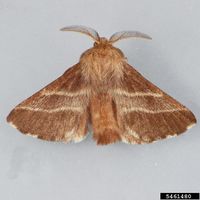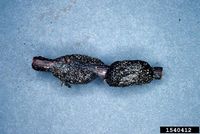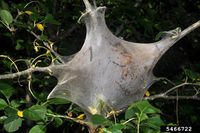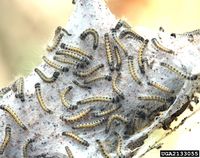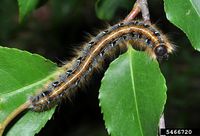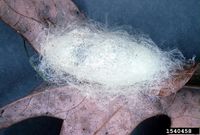Difference between revisions of "Malacosoma americanum"
From Pestinfo-Wiki
| Line 2: | Line 2: | ||
{{LiteratureDB|{{PAGENAME}}|browse,crops,benefialsN}} | {{LiteratureDB|{{PAGENAME}}|browse,crops,benefialsN}} | ||
[[File:Malacosoma americanum2.jpg|250px|thumb|''Malacosoma americanum'' (click on image to enlarge it)<br/>Author(s): Tom Peterson<br/>Source: [http://commons.wikimedia.org/wiki/File:Malacosoma_americanum2.jpg Wikimedia Commons]]] | [[File:Malacosoma americanum2.jpg|250px|thumb|''Malacosoma americanum'' (click on image to enlarge it)<br/>Author(s): Tom Peterson<br/>Source: [http://commons.wikimedia.org/wiki/File:Malacosoma_americanum2.jpg Wikimedia Commons]]] | ||
| − | <font color="#800000">'''''Malacosoma americanum'''''</font> Fabricius - (eastern tent caterpillar) | + | <font color="#800000">'''''Malacosoma americanum'''''</font> (Fabricius, 1793) - (eastern tent caterpillar) |
| − | + | This moth species is found in north-eastern North America where it feeds mainly on the leaves of Rosaceae like ''Prunus'' species. The larvae can defoliate trees and their bristles cause skin irritations. | |
| − | + | ||
| − | + | ||
| + | Females lay a single egg-mass in the summer and first instar larvae remain inside the eggs until the coming spring in diapause. They then hatch in a synchronized manner during bud burst. The caterpillars live gregariously and construct a silken tent for protection. The development of the larvae is completed in around 6 weeks. The last instar larvae disperse and eventually pupate in cracks of the bark. The adult moths do not feed and live only for a few days. | ||
Latest revision as of 16:12, 2 April 2019
| Literature database |
|---|
| 28 articles sorted by: |
| • year (recent ones first) |
| • research topics |
| • countries/regions |
| • host plants |
| • list of natural enemies |
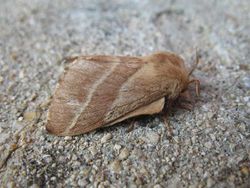
Malacosoma americanum (click on image to enlarge it)
Author(s): Tom Peterson
Source: Wikimedia Commons
Author(s): Tom Peterson
Source: Wikimedia Commons
Malacosoma americanum (Fabricius, 1793) - (eastern tent caterpillar)
This moth species is found in north-eastern North America where it feeds mainly on the leaves of Rosaceae like Prunus species. The larvae can defoliate trees and their bristles cause skin irritations.
Females lay a single egg-mass in the summer and first instar larvae remain inside the eggs until the coming spring in diapause. They then hatch in a synchronized manner during bud burst. The caterpillars live gregariously and construct a silken tent for protection. The development of the larvae is completed in around 6 weeks. The last instar larvae disperse and eventually pupate in cracks of the bark. The adult moths do not feed and live only for a few days.
- Other images of Malacosoma americanum (IPM Images - click to enlarge)
